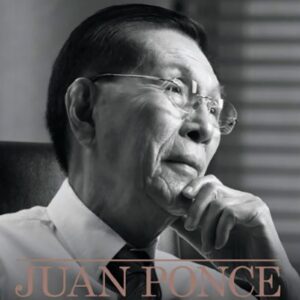MANILA, Philippines – Juan Ponce Enrile, a pivotal and deeply polarizing figure in Philippine history whose career spanned over half a century, culminating in his role as Defense Chief during the notorious martial law era and his later defection that helped overthrow the dictator, has died. He was 101.
Enrile’s daughter, Katrina Ponce Enrile, confirmed that her father passed away peacefully at home on Thursday, surrounded by his family, fulfilling his personal wishes. She noted that he had recently been receiving intensive medical care for pneumonia.
Enrile’s life mirrored the political turbulence of the Philippines’ modern era. A towering legal and political personality, he was one of the longest-serving officials in the nation’s history, holding key posts across multiple administrations.

🏛️ Marcos Jr. Pays Tribute to an “Enduring” Public Servant
President Ferdinand Marcos Jr., the son and namesake of the authoritarian ruler whom Enrile eventually helped topple, issued a statement praising the centenarian’s long service.
“We say goodbye to one of the most enduring and respected public servants our country has ever known,” Marcos Jr. said. “For over 50 years, Juan Ponce Enrile dedicated his life to serving the Filipino people, helping guide the country through some of its most challenging and defining moments. His death marks the close of a chapter in our nation’s history.”
Enrile’s extensive career began under the elder Ferdinand Marcos, whom he served starting in 1965. His dedication to public service was underscored by his appointment as Chief Presidential Legal Counsel by the current President Marcos Jr. in 2022, at the advanced age of 98. He had previously led the Departments of Justice and Finance, served as Customs commissioner, was a three-term Senator (including a stint as Senate President from 2008 to 2013), and represented his home province of Cagayan in the House of Representatives.
⚖️ The Shadow of Martial Law Atrocities
Enrile’s most controversial and historically consequential role was as head of the Department of National Defense, a position he held when the elder Marcos declared martial rule in 1972. Marcos cited the need to counter rising threats from left-wing demonstrations, Marxist guerrillas, and Muslim separatist insurgents. However, opponents widely viewed the declaration, made just a year before Marcos’ term was set to expire, as a calculated move to entrench his authoritarian grip, suppress dissent, and facilitate massive corruption.
During the martial law period, Congress and critical media outlets were padlocked, political opponents and activists were detained, and the nation was governed by decree. This era is infamously associated with systematic human rights atrocities.
SELDA (Samahan ng Ex-Detainees Laban sa Detensyon at Aresto), a group composed of former political detainees from that period, released a statement underscoring Enrile’s uncompromising role. They noted that Enrile was the defense chief when military and police forces “arrested, tortured, and caused the enforced disappearance of thousands of activists, students, journalists and ordinary citizens…and yet, until the end of his life, he neither acknowledged nor apologized for the atrocities committed under his watch.”
Thousands of Filipinos were incarcerated, tortured, and disappeared under martial law, with some individuals remaining missing to this day. Enrile, until his death, remained silent on the accountability for these egregious abuses.
💥 From Loyalist to Rebel: The ‘People Power’ Uprising
The dramatic shift in Enrile’s allegiance began with a growing rift between his camp and the ailing Marcos and his inner circle of loyalist generals. A failed coup attempt staged by Enrile-aligned military officers forced his hand. In February 1986, the Defense Chief publicly broke away from the regime. He was quickly joined by Fidel Ramos, then the head of the Philippine Constabulary (the predecessor of the national police force), who also withdrew his support for the dictator.
This dramatic defection triggered the 1986 “People Power” uprising. Millions of Filipinos mobilized, converging on the EDSA highway in Manila to form a human shield around Enrile and Ramos against Marcos’ loyalist military forces. The peaceful, civilian-backed revolution culminated in the ouster of Ferdinand Marcos Sr., who was driven into U.S. exile with his family and cronies. The event became a global harbinger of change for other authoritarian regimes.
Despite the democratic triumph, the post-dictatorship era failed to fully address deeply entrenched issues such as poverty, stark wealth inequality, and past wrongdoings, leading to persistent political and social divisions.
⏳ Legal Battles and Final Acquittal
In the tumultuous years following the dictatorship, Enrile was detained twice, linked to several military rebellions, including mutinies against President Corazon Aquino, the pro-democracy leader who succeeded Marcos.
More recently, Enrile faced serious corruption charges. In 2014, he surrendered after being indicted by the anti-graft Sandiganbayan court for allegedly receiving enormous kickbacks from the “pork barrel scam”—a scheme that diverted millions of dollars in anti-poverty and development funds intended for lawmakers.
While he denied the accusations and mounted a robust legal defense, he was detained for a year. The Supreme Court granted his petition for bail in 2015 on humanitarian grounds. Significantly, the court ultimately cleared him of the serious plunder charge last year due to insufficient evidence, and then acquitted him of the related graft charges just last month after an extended trial.
“I knew all along that I’ll be acquitted because I haven’t done anything,” the centenarian Enrile remarked following the final verdict.
The Department of National Defense, where Enrile holds the distinction of being the longest-serving chief, honored his memory by flying the Philippine flag at half-staff on Thursday. “His long and storied career in public service marked profound changes in our nation’s history,” the department stated. “His legacy in our country’s politics and governance will always be remembered.”





